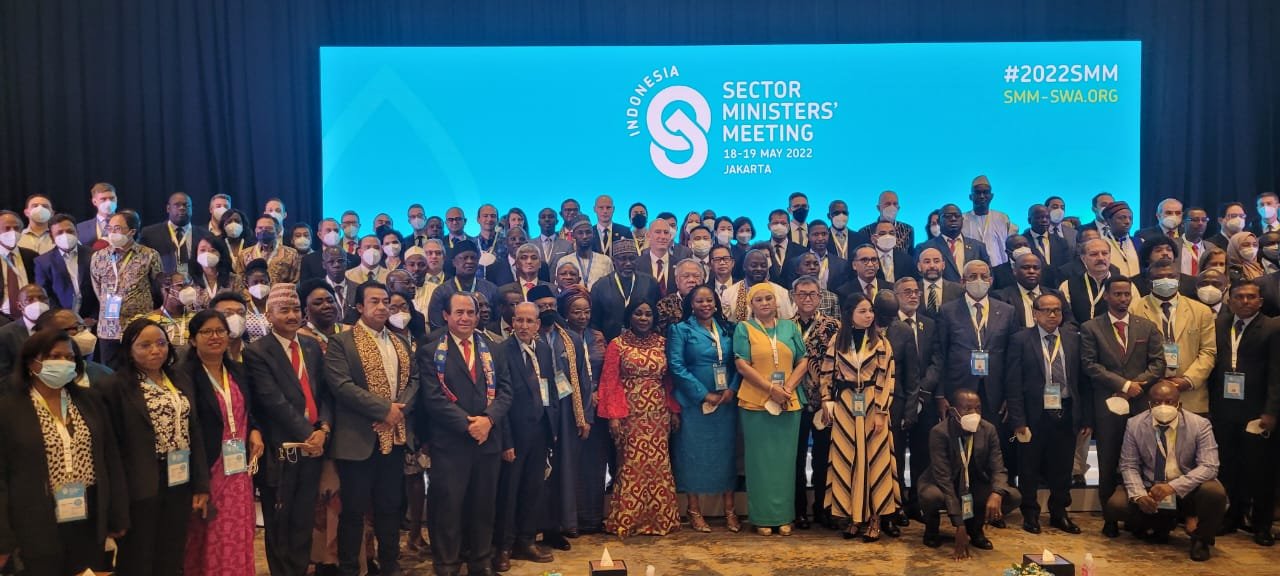From COVID-19 to Climate Action: Water at the Sector Ministers’ Meeting
How do countries around the world recover from the “triple-crisis” – the pandemic, economic downturn, and climate change? And how can this “triple-crisis” be transformed into a “triple-win” of sustainable solutions for water, sanitation, and hygiene (WASH) which are climate resilient and strengthen our economies?
This was the theme of the 2022 Sector Ministers’ Meeting, held on 18-19 May in Jakarta, Indonesia. The meeting brought together over 50 ministers of water, health, environment, and economy from 37 countries to share achievements and prioritize investment in water and sanitation. The event was convened by Sanitation and Water for All (SWA) and hosted by the Government of Indonesia.
At the meeting, ministers described success stories of generating political action, securing financing, and constructing infrastructure solutions tailored for their countries.
While the ongoing COVID-19 crisis has undoubtedly slowed progress towards Sustainable Development Goal 6, it also accelerated urgency for action. One minister shared, “We have never run like we ran during Covid.”
The response to the COVID-19 pandemic demonstrates what we can do when we come together in a time of great need:
Work quickly to develop innovative new solutions and strategies with specific, measurable targets
Test those solutions, assess the results, and make changes as needed to ensure that objectives are being met – recognizing also that the end goal may be changing too
Create effective multi-sector coalitions and task force teams willing to work together to develop and implement these new strategies
This approach – and the speed with which it was adopted – serves as an inspiring template for action on climate change.
Critical progress has been made in the WASH sector to include considerations for climate change. At the Sector Ministers’ Meeting, climate change was most often referred to as a threat to WASH infrastructure. Recognizing the vulnerability of the WASH sector to climate change is important, especially since the vast majority of climate impacts are related to the water cycle.
However, it is also necessary to change the old narrative of building infrastructure to overcome or combat climate change. Instead, how can we enable flexible and effective decision making to build resilience in an uncertain future? One country shared that they see the provision of drinking water not as a matter of infrastructure planning, but as a key part of climate adaptation.
Ministers at the Sector Ministers’ Meeting committed to ensuring that climate resilience is prioritized in all WASH policies, plans and programmes, and climate-resilient WASH is a central component in National Adaptation Plans.
Decision making in the context of climate change must also acknowledge WASH in relation to water resources more broadly. The Sector Ministers’ Meeting included ministers from environment and water ministries, one of which typically houses water resources, depending on the government’s structure. Enabling this cross-ministry conversation is a vital step in developing a water-centric approach to climate action.
As a civil society organization in partnership with SWA, AGWA provides support to countries as they revise their national climate plans to ensure that effective mitigation and adaptation actions are included from the WASH sector. The Water Tracker for National Climate Planning is a tool that helps countries to understand the role of water in responding to climate change, across all sectors. This enables countries to make more informed decisions about tradeoffs in the context of climate change, and helps to ensure that WASH remains a priority.
AGWA also works with governments to identify the strengths and weaknesses of existing national water supply and water management plans, providing recommendations to integrate climate resilience into those plans.
Water is the foundation of resilient societies and lies at the heart of climate change. Our personal health, the health of our economies, and the health of our planet are all deeply and fundamentally tied to water. Delivering on universal access to water and sanitation, and enabling resilient water management in the face of climate change, will reap benefits across all the Sustainable Development Goals.
Kelsey Harpham, Project Manager, AGWA

